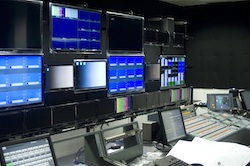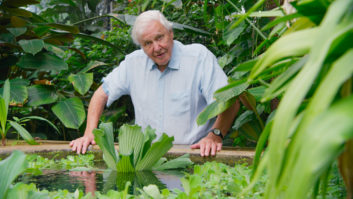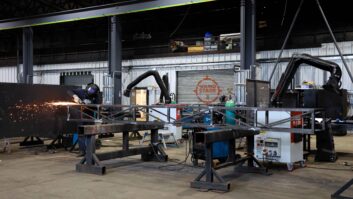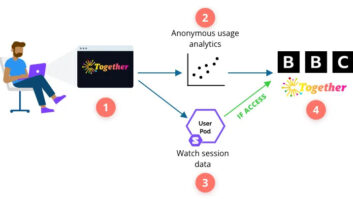
With the 2012 Olympics in London, the BBC as rights-holding broadcaster for the UK has a special responsibility. It has seized the opportunity presented by digital broadcasting to make a unique claim: every event will be broadcast live.
Inevitably in a project like this it is the numbers that are staggering. The BBC production area has around 200 incoming circuits from all the venues, and from two dedicated studios. Each venue has the multi-lateral feed, created by Olympic Broadcast Services, and are directly routed into the BBC centre.
At many events the BBC will have its own unilateral feeds to tailor the content for British viewers. Some will be from BBC operated outside broadcast trucks; some from one or two camera units for local presentation.
The fact that all these feeds will be arriving over different fabrics, and given the fact that the satellite bandwidth is likely to be crowded, was one of the causes for concern at the design stage. Each incoming feed needs to be checked for quality control, and passed through timebase correctors and other processing to ensure everything is synchronised by the time it reaches the production staff.
At the other end of the operation there are up to 24 parallel outputs, to meet the goal of covering every event. Through careful negotiations with Sky for satellite, Virgin for cable and Freeview for terrestrial, as far as possible these are all independent channels on the EPG rather than red button services. According to the BBC this will make it easier for viewers to find their preferred sport, and to record it if they cannot watch it live.
As well as dedicating channels to Greco-Roman wrestling and synchronised swimming, the BBC is also presenting packaged programming on two of its channels. BBC One will carry the main Olympic coverage, with a second live programme running on BBC Three.
These will be presented from two studios built on top of a temporary structure at a crossroads in the Olympic Park, around 500m from the BBC’s part of the IBC. For BBC One there is a large glass box. BBC Three has an outdoor presentation space to feel more a part of the atmosphere.
Back in the IBC there are separate production control rooms for BBC One and BBC Three, each with a Sony production switcher and a separate audio room with a Studer mixer. There is a third gallery with similar hardware to allow for other productions from around the site, and for news use.
The fourth main output area is responsible for all the other streams, which inevitably is much more about routing the right feeds to the right outputs, maintaining seamless presentation and overseeing quality. Most of the feeds from venues for these channels will arrive complete with BBC commentary, but where the need arises there are a couple of “off the tube” rooms for local voiceovers.
In the middle is an infrastructure based on that installed at BBC Sport’s headquarters in Salford. Eight EVS XS servers are used for ingest; content storage and playout is on Omneon MediaGrid; and 21 Avid editors sit on an Isis server. 13 editors are used by journalists and producers in the open plan office to create highlights packages, and there are eight craft suites adjacent to it all. Graphics come from eight Vizrt suites.
Harris in harmony
The underlying architecture relies heavily on Harris equipment, including the Selenio platform as well as standard modular frames. With all the signals flying around there is a huge call for multi-viewers, and there are 16 frames each holding six cards of Harris 6800+ quad splits, some of which are cascade for 16 to view. The architecture also uses the newer Harris H View Pro multiviewers that put up to 64 signals on a screen. Some of the H View Pro cards are in standalone frames, others are in the 512 x 1028 Harris Platinum router.
The system has been built by Dega Broadcast Systems. Director John Cleaver has been living the project for the last two years. “The BBC wanted to start back then to ensure the hardware and the installation resource would be available,” he said. “This is their biggest Olympics yet, and they had a clear idea of what they wanted to achieve.”
The system design was very much a joint effort between BBC and Dega. Resilience was a key feature, with as much redundancy as practical, and detailed design to minimise the effects of a failure. The I/O ports on the router, for example, are carefully chosen to ensure that a main feed and an alternate never pass through the same card.
One of the effects of developing the technology over two years is that new techniques come along which were not available at the start of the project. It makes extensive use of the Harris Selenio, the media convergence platform which is capable of handling both IT and realtime video and audio files simultaneously.
“It is a slick way of providing layers of signal processing,” according to Cleaver. The 26 frames at the Olympic IBC are used for a lot of audio processing, including Dolby encoding, AES embedding, synchronising and shuffling, as well as video tasks like colour correction.
Conspicuous by their absence in the installation are VTRs: this is a file-based production, managed by the BBC’s BNCS control system. Of the 200km or so of cable, a substantial proportion is Cat-5 ethernet.
As well as its unique sports streams and the two national channels the centre also supports the BBC’s national and regional news services who will want to create their own stories: additional Avid editors are available for them attached to the content network.
In total the BBC will have around 300 staff on site, including about 70 journalists. They, and the systems engineers who have designed and built this remarkable facility, have to accept the fact that if all goes well they will be forgotten as we celebrate the successes of our favourite athletes.
By Dick Hobbs







